The Bridge Blog
A dialog about our new bridge and these web pages
Overview. As a pointy-headed
university professor, my weekend project of bridge photography and
building these web pages generated many questions and introduced me
to just-in-time learning. I enjoy chasing my curiosity and
want to identify ways to encourage younger learners to also enjoy curiosity
chasing and learning.
Learning usually requires repetition while forgetting occurs when
I infrequently use information. Many young learners do not understand
the importance of repetition. Weekly visits to the bridge provided
the repetition necessary to detect changes in the bridge and
consequently generated
many questions and opportunities for learning. Over the course of the
bridge project, I had access to few experts for answering questions.
Rather than a liability, this became an asset and pushed me to improve
my search skills with Google. Soon, I found that answers
to questions encountered during my weekly photo shoots were often
only a Google-search away -
(see
Restoring the Joy in Learning). Consequently Google + Internet became
dependable extensions of my memory.
The bridge story is a work in progress and is evolving from a simple
collections of photographs to an experiment with Internet-centric
just-in-time learning.
Insights I gain from you
will find their way into the learning centers of MUSC.
Palmetto Bridge Constructors, a joint venture between
Tidewater
Skanska and
Flatiron Constructors, as well as
High Steel Structures,
Freyssinet, the
SCDOT and the
Federal Highway Commission Office
of Bridge Technology guided much of my learning.
I also learn from many of you and from Google-linked resources. More
important is the e-mail encouragement I receive from many of you.
Sat, 13 Aug 2005
August 13, 2005: A suggestion to Mayor Riley and the Transportation Board
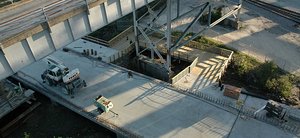 During the construction of the Morrison Street on-ramp, bicycle and pedestrian
walkway, there was an obstacle at the base of the Pearman bridge. A vertical
support structure prevented paving a small section of the bicycle lane. A
small wooden platform was built around the Pearman supports - a sort of
detour.
During the construction of the Morrison Street on-ramp, bicycle and pedestrian
walkway, there was an obstacle at the base of the Pearman bridge. A vertical
support structure prevented paving a small section of the bicycle lane. A
small wooden platform was built around the Pearman supports - a sort of
detour.
With the demolition of the Pearman and Grace moving ahead (briskly), I
understand that this platform will be removed when the vertical supports
are removed. Then the bicycle lane paving will be completed.
But what a perfect spot to place a few park benches
so that walkers can stop, rest and contemplate not only our wonderful
bridge, but life, the universe and everything. So what about this option,
is it possible to modify the contract with Cashman-Testa to not remove
the wooden platform and for the City to populate it with a few park
benches - particularly useful to maturing adults (age > 60)?
posted at: 07:08 | path: | permanent link to this entry
Sun, 07 Aug 2005
August 7, 2005: Experimenting with Nikon raw image format
Vince Streano convinced me that I should take my serious photos using
RAW image formats instead of jpg - due to small artifacts introduced
by the data compression process. For most of my academic work, open source
tools meet 80 - 90% of my needs. This morning I took a photo of the
Ravenel Bridge just to test the idea - in both RAW and high resolution
JPEG format.
UFRaw is a
GIMP plugin that facilitates
processing Nikon raw formats without having to install Nikon software.
Here is an early morning photo of the Ravenel Bridge with the Pearman
and Grace Bridges in the background
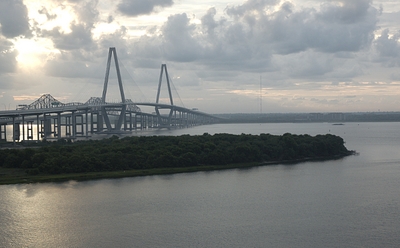
And the jpeg equivalent
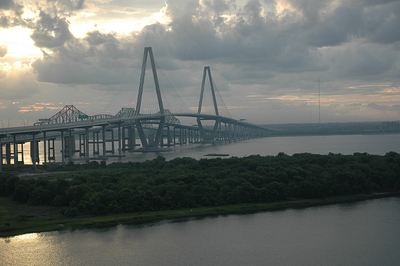
posted at: 09:51 | path: | permanent link to this entry
Sat, 06 Aug 2005
August 6, 2005: What is the connection between the Tour de France and building the Ravenel Bridge?
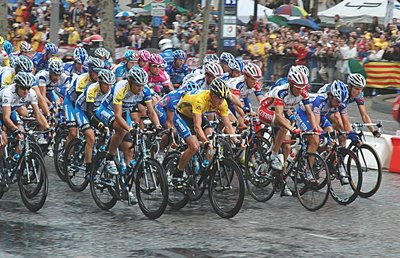
It was July 21, 2004 when David Wertz from SCDOT provided me with my first
inside look at the bridge construction processes. The motivation came
from Bill Mankin at High Steel Structures in Lancaster Pa - who had been
exchanging email with me about which steel came from them and which steel
came from other vendors. About a week before I noted that some edge
girders were being lifted using cranes anchored in the river and wondered
about how the stability of the crane barge was adequate for the precision
placement of the edge girders.
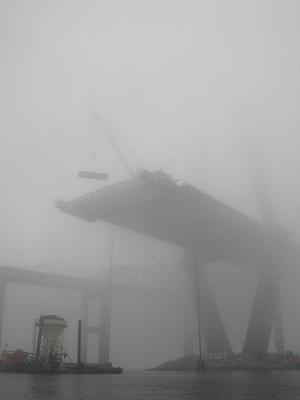 The fog that day was thicker than pea soup and it was impossible to see
the erection process from the water. So we visited the deck of the
left main span. While waiting for the fog to clear we were invited to
look at the cable installation process inside the west pylon. This was
my first exposure to the French group of Freyssinet. Later, we visited
the top of the west tower and looking down I watched the Freyssinet
guy direct the strands of cables as they were fed from the anchorage
area see ( for the details).
He was wearing a Freyssinet t-shirt and with Google I found that Freyssinet
was a French company. I thought to myself, wow, what a great vantage
point to watch the final stages of le Tour de France - even if it is
3000 miles away.
The fog that day was thicker than pea soup and it was impossible to see
the erection process from the water. So we visited the deck of the
left main span. While waiting for the fog to clear we were invited to
look at the cable installation process inside the west pylon. This was
my first exposure to the French group of Freyssinet. Later, we visited
the top of the west tower and looking down I watched the Freyssinet
guy direct the strands of cables as they were fed from the anchorage
area see ( for the details).
He was wearing a Freyssinet t-shirt and with Google I found that Freyssinet
was a French company. I thought to myself, wow, what a great vantage
point to watch the final stages of le Tour de France - even if it is
3000 miles away.
Each year, my son-in-law, and economist that studies French and California
agriculture policies related to wine production, rents a flat in France and
Ellen and I provide babysitting duty. This year Trevor rented a flat about
6 - 8 blocks from the Arc de Triomphe, where the race would end with several
loops up the Champs Elysees. What an opportunity to close the loop
with Freyssinet that started the year before. We arrived in Paris on the
23rd and Sunday about 1pm we made our way to the Champs Elysees to watch
and maybe photograph the finish.
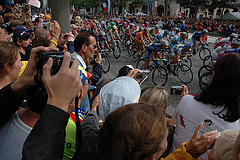 The crowd was wall to wall people - even 4 hours before the peloton arrived -
and I am impatient and what to do standing in place for 4 hours? I decided
that the crowd and the competition for photos was really worth documenting and
took this photo - just to show all the cameras (count them if you can). I
was about 3 rows back - and the only way I could take an unobstructed photo
was to hold the camera high above my head, aim and click - blindly taking
photos of whatever my camera was pointed toward.
The crowd was wall to wall people - even 4 hours before the peloton arrived -
and I am impatient and what to do standing in place for 4 hours? I decided
that the crowd and the competition for photos was really worth documenting and
took this photo - just to show all the cameras (count them if you can). I
was about 3 rows back - and the only way I could take an unobstructed photo
was to hold the camera high above my head, aim and click - blindly taking
photos of whatever my camera was pointed toward.
After the finish, Trevor and I returned home downloaded our photos and
discovered we caught Lance Armstrong and his Discovery team on their first
pass up
the Champs Elysees. For the story of our Paris holiday and photos
of the Tour de France
visit
our Paris flat, dinners on our terrace and views of many
interesting things.
The adventure from July 21 2004 and my introduction to Freyssinet to July 24,
2005 and the finish of le Tour de France cannot be described.
For this adventure, I thank Trevor, of
course, Marvin Tallent, an avid cyclist who works for Flatiron and
was in charge of QA and QC for the bridge and was my guide for many
constructions issues, and finally
Oliver Forget and his colleagues at Freyssinet who shared with me an inside
look at stay cable installation and testing.
posted at: 07:24 | path: | permanent link to this entry